Filter 281 resources:
- productivity (172)
- creativity (75)
- ai (49)
- knowledge management (44)
- tool (31)
- gtd (29)
- innovation (23)
- psychology (21)
- social media (19)
- content strategy (18)
- llm (18)
- minimalist (15)
- myhub (15)
- 2ndbrain (15)
- zettelkasten (15)
- meeting (14)
- management (14)
- curation (12)
- personal (11)
- obsidian (10)
- organisation (10)
- newsletter (9)
- community (8)
- mindfulness (8)
- annotate (8)
- project management (8)
- facebook (8)
- chatgpt (7)
- roamresearch (7)
- k4p (7)
- addiction (6)
- writing (6)
- internal communications (6)
- design (5)
- ideation (5)
- collective intelligence (5)
- information architecture (5)
- deletefacebook (5)
- knowledge graph (5)
- google (5)
- collaboration (4)
- notebooklm (4)
- cognitive (4)
- communications (4)
- podcast (4)
- algorithm (4)
- strategy (4)
- blogging (4)
- andy matuschak (4)
- trello (4)
- centaur (3)
- post-alpha (3)
- attentionweb (3)
- covid19 (3)
- eu (3)
- leadership (3)
- video (3)
- fediverse (3)
- guide (3)
- pkm (3)
- top3pods (3)
- data (3)
- happiness (3)
- twitter (3)
- multitasking (3)
- science (3)
- media (3)
- content (3)
- douglas rushkoff (3)
- employee engagement (3)
- synthesise (3)
- business model (3)
- meaning (2)
- storytelling (2)
- m365 (2)
- ethan mollick (2)
- faq (2)
- yanss (2)
- coda (2)
- journal (2)
- machine learning (2)
- note (2)
- search (2)
- casey newton (2)
- asana (2)
- email (2)
- screencast (2)
- ontology (2)
- intranet (2)
- notion (2)
- authenticity (2)
- learning (2)
- indieweb (2)
- blog (2)
- memory (2)
- disinformation (2)
- mastodon (2)
- inscrutable (2)
- coach (2)
- decentralised (2)
- fomo (2)
- agile (2)
- media literacy (2)
- framework (2)
- diversity (2)
- ifttt (2)
- diigo (2)
- massive.wiki (2)
- stowe boyd (2)
- culture (2)
- software (2)
- change (2)
- brainstorming (2)
- ai prompt (2)
- training (2)
- routine (2)
- stream (2)
- brussels bubble (1)
- overtask (1)
- play (1)
- micro.blog (1)
- posse (1)
- data4policy (1)
- inbox zero (1)
- sapiens (1)
- substack (1)
- zenkit (1)
- syllabus (1)
- scarcity (1)
- art (1)
- bundle (1)
- understanding (1)
- surprisal (1)
- gpt-x (1)
- qanon (1)
- us2020 (1)
- participatory culture (1)
- solid (1)
- clickup (1)
- tiktok (1)
- memex (1)
- spaced repetition (1)
- arg (1)
- search-or-create (1)
- fedwiki (1)
- web20 (1)
- tools (1)
- collaborate (1)
- reading queue (1)
- stuck (1)
- procrastination (1)
- pkgbook (1)
- speech to text (1)
- transcript (1)
- subconscious (1)
- fotl (1)
- readwise (1)
- canonical debate lab (1)
- ma parent (1)
- hyperknowledge (1)
- scrivener (1)
- kanban (1)
- screen writing (1)
- bluesky (1)
- autosummarise (1)
- ted chiang (1)
- tracker (1)
- llamaindex (1)
- embedding (1)
- agent (1)
- assistant (1)
- alignment (1)
- alphafold (1)
- human (1)
- reinforcement learning (1)
- recursion (1)
- deep learning (1)
- ezra klein (1)
- persona prompt (1)
- giannigiacomelli (1)
- harpa (1)
- quality (1)
- boston consulting group (1)
- jagged frontier (1)
- cyborg (1)
- reference frame (1)
- sensecraft (1)
- smart connections (1)
- joan westenberg (1)
- sublime (1)
- sari azout (1)
- ai search (1)
- sift (1)
- course (1)
- flow state (1)
- commoditisation (1)
- linear (1)
- butter (1)
- robert putnam (1)
- idpi (1)
- ai4communities (1)
- model collapse (1)
- capacities (1)
- ghostreader (1)
- unfinished (1)
- atprotocol (1)
- gdpr (1)
- whitewind (1)
- regulation (1)
- platform (1)
- morality (1)
- genius (1)
- futurism (1)
- policy (1)
- digital transformation (1)
- infographic (1)
- visualisation (1)
- habit (1)
- transparency (1)
- participation (1)
- advertising (1)
- society (1)
- journalism (1)
- news (1)
- filter bubble (1)
- nlp (1)
- confirmation bias (1)
- data journalism (1)
- groupthink (1)
- original (1)
- linkedin (1)
- meditation (1)
- instagram (1)
- mapping (1)
- trust (1)
- information (1)
- dikw (1)
- garden (1)
- willpower (1)
- seamful (1)
- psychometrics (1)
- bias (1)
- trump (1)
- science communication (1)
- atomisation (1)
- conspiracy (1)
- semantic (1)
- overfitting (1)
- risk (1)
- wikipedia (1)
- interface (1)
- expertise (1)
- purpose (1)
- intro (1)
- big data (1)
- ec (1)
- chat (1)
- office (1)
- hr (1)
- honesty (1)
- native advertising (1)
- bullshit (1)
- engagement (1)
- team (1)
- ibm (1)
- clickbait (1)
- remote (1)
- biology (1)
- automation (1)
- tutorial (1)
- commonplace (1)
- philosophy (1)
- time (1)
- holacracy (1)
- task (1)
- longform (1)
- disruption (1)
- social capital (1)
- share (1)
- career (1)
- competition (1)
- library (1)
- google assistant (1)
- coffee (1)
- conversation (1)
- copyright (1)
- cms (1)
- silos (1)
- basecamp (1)
- datamining (1)
- vine (1)
- dao (1)
- autonomous (1)
- plagiarism (1)
- gender (1)
- workspace (1)
- bestpractice (1)
- open source (1)
- zappos (1)
- laloux (1)
- teal (1)
- rss (1)
- wiki (1)
- reframing (1)
- wellness (1)
- genetic (1)
- humanity (1)
- overload (1)
- ideas (1)
- hbr (1)
- surveillance (1)
- healthcare (1)
- brain (1)
- evolution (1)
- calendar (1)
- taxonomy (1)
- template (1)
- workflow (1)
- gmail (1)
- video_conferencing (1)
- evidence-based policy (1)
- weeklyreview (1)
- review (1)
- prezi (1)
Overview: Personal Productivity
There's so much out there written about personal productivity that it can be difficult to know where to start.
Most is what I call "productivity porn" - content created by and for people more interested in endlessly polishing and tweaking their "productivity stack" than actually using it. Some of the most successful content creators in this space, after obsessively developing highly sophisticated systems based around a particular combination of productivity tools, monetise it in the form of books and courses.
However there's a problem with this approach:
- each system has been painstakingly honed by the author for the author...
- ... but you're not the author, and - unfortunately - what works for them won't necessarily work for you
- moreover, trying to reverse engineer someone else's finely tuned system risks breaking it apart.
Personal Productivity Framework
You're better off developing your own - the question is how. The answer is to use a Framework - a way of thinking about personal productivity that helps each person find their own system, meeting their specific needs and preferences.
A lot of the content curated below went into my own personal productivity system, from which I've distilled a personal productivity framework which divides productivity into three pillars, with each pillar supporting the other two:
- time management: an “ideal day” ensures you work in synch with your brain’s ability to focus and ringfence your day’s Most Important Task, and carves out time for daily and weekly routines to support ..
- task management, which borrows liberally from Getting Things Done (GTD) and integrates it with …
- knowledge management: a content pipeline for managing everything from random thoughts to published content, and ensuring you get the most out of what you read.
I've written a fair bit about this myself (see what I think tagged #productivity), and recently boiled it all down to a short and inexpensive online course: Personal Productivity Framework.
Relevant resources
With BlogActiv feeling a bit creaky, I spent the summer taking a hard look at Google+ and Tumblr, and integrated my GTD (Getting Things Done) system with my online presence.

"Trello's a fantastic free app which is fun to use, and makes planning content workflows a snap. The video outlines a workflow, and you can download the Trello board shown"
An update to a post first published in 2013, as I created a first version of MyHub on Tumblr.
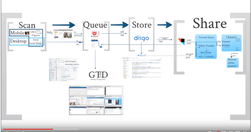
2019 update: a short Prezicast video from 2013 on my personal productivity system, since covered on Medium: https://medium.com/better-humans/manage-the-firehose-or-it-will-manage-you-791097bc53e2
"But if these practical tips don't help, remember that overload is a matter of perspective. We could also say when we walk out the front door of where we live, 'Oh my gosh, there's so many blades of grass, I have lawn overload ... [but] Are these things really flying at us, or are we not making the choices we need to make?""
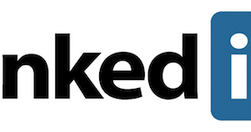
"I challenge myself to answer the following questions in everything I read: - Has this taught me anything new and valuable? (If not, move on quickly) - How can I apply insights from this article today? (Wait and I’ll forget) - When have I applied the ideas from this post? Where have I not, but could have? (What was the difference?)"
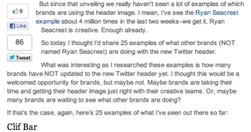
You have absolutely no time. Yet your boss is asking you to stay on top of all things social media-related. And, you need more information to do your job more effectively–and efficiently. And you want to stay smarter about industry trends. ... In my presentation, I lay out 8 strategies for staying up-to-date on all the changes, new products/tools …
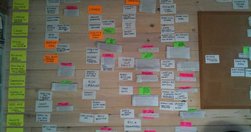
"Trello is a to-do list manager and project management webapp that’s based on the metaphor of index cards pinned to a board. The cards each flip over, giving you a workspace where you can discuss the task, create smaller checklists, assign responsibility, or add other notes. To change the status of a task, move it to a different list on your board…

Worth a read, food for thought: "But while we love reading up on how these leaders turned the tide in their industry or organization, recent research suggests that most creative people aren't given the opportunity to lead. We love stories of creative people; we just don't want to be led by them."
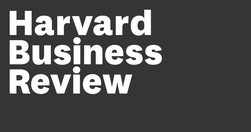
God this applies: the unimportance of almost everything you do.
Loading more...